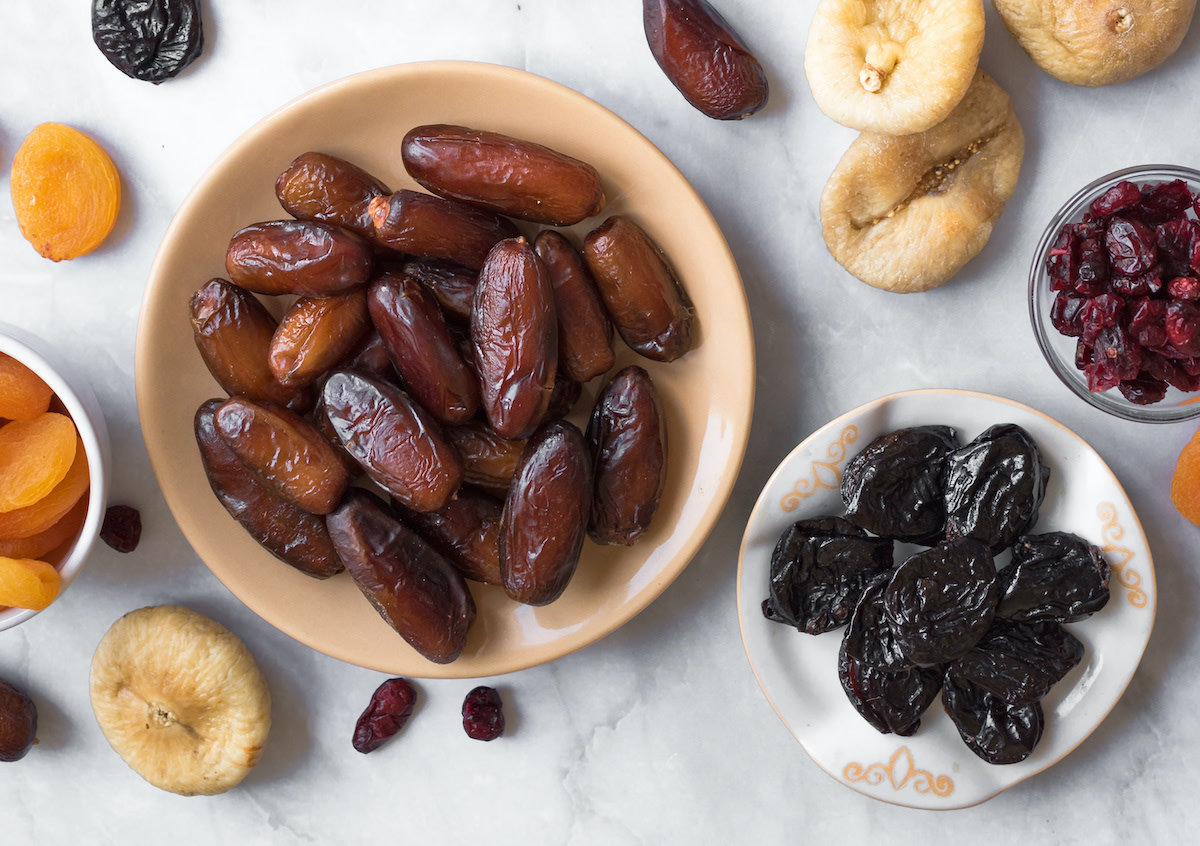Date vs. Prune: Differences Between Dates and Prunes
Written by MasterClass
Last updated: Oct 8, 2021 • 3 min read
Dates and prunes are two different types of fruit, each with its own flavor, texture, and nutritional profile.
Learn From the Best
What Are Dates?
Dates are the fruits of the date palm tree, indigenous to the Middle East. Dates are small, oblong, and usually dark in color. These fruits, which are typically consumed after they have been dried, are very sweet, relatively high in calories, and packed with nutrients.
6 Types of Dates
There are many different types of dates. Typically, Medjool dates are the most readily available at U.S. supermarkets. Depending on the time of year and your geographic location, it might be possible to find other varieties of date:
- 1. Medjool: The Medjool date is the most commonly sold date in the U.S. They are large and juicy with a maple flavor that makes them great for cooking and baking.
- 2. Deglet Noor: Deglet Noor dates are the second most commonly available date in the U.S. They have a subtler flavor than Medjools with a slightly nutty taste.
- 3. Barhi: Sweet Bahri dates are typically enjoyed as snacks or desserts and are popularly grown in Southern California. They’re very delicate which makes them difficult to cook with.
- 4. Halawi: Halawi dates are small fruits that have a buttery caramel flavor.
- 5. Mazafati: Mazafati are medium-sized dates with a sweet taste and a soft, fleshy texture.
- 6. Kadrawi: Kadrawi dates have a syrupy taste and a gooey texture, making them a popular choice for baking.
What Are Prunes?
Prunes are dried plums. To make a prune, simply pit and dry a plum. There are many varieties of plums available, though store-bought prunes typically won’t name the specific variety. With some planning and persistence, you can make your own prunes based upon the specific seasonal varieties available in your region.
Dates vs. Prunes: What’s the Difference?
Dates and prunes are usually consumed in their dried form and look similar. However, they are two completely different species of fruit, and each has its own specific properties:
- Taste: Dates are the sweeter of the two fruits. Eaten raw, they are less intensely sweet, and will have a lighter texture. In their common form as dried fruits, they can be very sugary due to their high levels of fructose and glucose and taste like maple, honey, or caramel. Prunes are milder in flavor to dates, with a hint of acidity. They are less suitable for baking, as the sugar content is lower, but their overall flavor is more subtle.
- Appearance: Dates are often smaller than prunes, and unlike prunes, unless they are pitted, they contain a round, pointed pit. Some dates, such as Medjools, will be quite dark, while some will be a lighter, caramel-like color. Prunes begin life as plums, and although the drying process shrinks them somewhat, they are still sometimes larger than dates. They are dark in color, and will have a delicately wrinkled surface texture.
- Texture: Dates are soft, and in some cases they have a gooey texture, although some will be a bit dryer and more tough with an outer skin that is flaky. This depends on the variety and how they were prepared. The texture of prunes is similar to other dried stone fruits, such as apricots. Somewhat chewy, with a slight stretchiness to the flesh, prunes are still soft and easy to eat.
- Nutrition: Dates and prunes are both highly nutritious. Dates are much sweeter, and thus higher in carbohydrates and calories. They have high levels of vitamins such as B6 and the minerals iron, manganese, magnesium, and zinc. They also contain calcium, selenium, and copper. Prunes contain health-promoting antioxidants, and are rich in vitamin A, vitamin K, and the minerals copper and potassium. Like dates, they are also high in dietary fiber, making them good for digestive health.
Want to Learn More About Cooking?
Become a better chef with the MasterClass Annual Membership. Gain access to exclusive video lessons taught by the world’s best, including Wolfgang Puck, Gabriela Cámara, Chef Thomas Keller, Massimo Bottura, Dominique Ansel, Gordon Ramsay, Yotam Ottolenghi, Alice Waters, and more.
